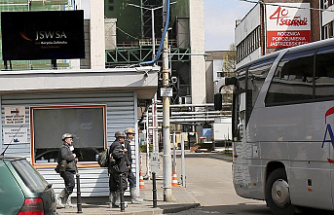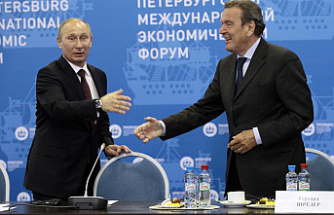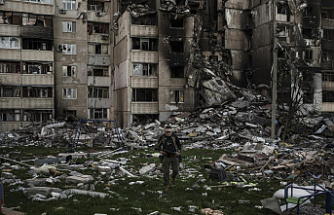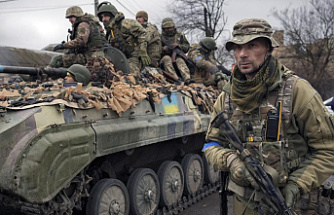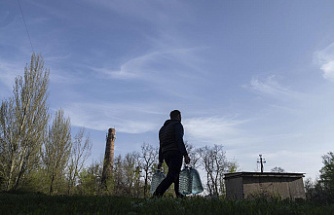WASHINGTON -- The border between Russia and Ukraine was not closed by Russian troops, a senior Biden administration official said Wednesday night to reporters. This contradicts Moscow's claims that it was withdrawing some forces.
The official stated that "we now know it was false" and added that up to 7,000 troops had joined the 150,000 soldiers at the border in the past days.
According to the official, troops had arrived in Ukraine as recently as Wednesday. Moscow could also launch a false pretext for an invasion of Ukraine at any time. Official also made one of the most dire assessments of the likelihood of reaching a diplomatic resolution to avoid war.
The official stated that Russia keeps claiming it wants to find a diplomatic solution. However, their actions suggest otherwise. "We hope that they will change their course before starting a war which will cause catastrophic destruction and death."
Moscow said that it was reducing the number of 150,000 troops the United States and its allies warned have converged on Ukraine from three sides. The West was skeptical of Russia's high-stakes signals, as the world searched for signs that a new deadly conflict might be avoided.
On Wednesday, Secretary of State Antony Blinken stated that "we continue to see crucial units moving towards the border. Not away from the border." "There are two types of Russia: what Russia says and what Russia does. We have not seen any pullback by its forces."
He said that it would be great if they actually followed through with what they had promised, but we have not seen it so far.
The country held a national day of unification in Kyiv, where Ukraine leaders tried to downplay that alarm.
In an apparent attempt to support its claims of partial withdrawal, Russia's defense ministry released video of an armored vehicle train moving across a bridge towards Crimea, Ukraine, which Moscow annexed in 2014.
This announcement came a day after a similar one. Russian President Vladimir Putin spoke up about the possibility of a diplomatic solution to the crisis.
However, leaders in Washington and Europe cautioned against overreacting.
Dmytro Kuleba (the Ukraine's foreign minister), tweeted Wednesday, saying that "statements regarding withdrawal aren’t sufficient." Transparency and facts are essential."
Jens Stoltenberg, NATO Secretary General, told reporters in Brussels that Russia had "increased its troops" and that more troops were on the horizon.
Stoltenberg stated Wednesday that the NATO defense ministers met with him and that there has been no sign of "de-escalation on ground", or withdrawals of troops and equipment.
Stoltenberg stated that Russia has a "massive invading force ready to attack with high end capabilities from Crimea and Belarus", noting that this is the largest European buildup since the Cold War.
He said that NATO had sent "concrete propositions" to Russia on transparency, risk reduction, and arms control. Russia has not responded.
Stoltenberg said that Russia's attempts to intimidate other countries with its military has become "the new norm in Europe." This has led defense ministers to come up with options Wednesday to increase NATO's defense and deterrence. He suggested that one option is to establish new NATO battlegroups in central and eastern Europe.
NATO defense ministers stated in a joint statement Wednesday that their strategy includes "additional ground forces" and "additional maritime, air assets." Ministers described the measures "preventive", proportionate, and non-escalatory.
Ursula von der Leyen was president of the European Commission and described it as "the largest buildup of troops on European soil ever since the darkest days during the Cold War."
She said that Russia was sending conflicting signals about what it wanted to do next, just like U.S. officials.
Tensions are rising and three U.S. Navy P-8 Poseidon surveillance planes came into close contact with several Russian jets last weekend over the Mediterranean Sea, according to the Pentagon. They also stated that the U.S. aircrafts were in international waters when they were intercepted.
Two defense officials said that while no one was hurt, the intercepts were not professional. These intercepts are not uncommon, but they are often deemed professional or safe.
A spokesperson for the Navy, U.S. Captain Mike Kafka said that "we have made our concerns known through diplomatic channels to Russian officials." "While no one was injured, interactions like these can lead to miscalculations or mistakes that could lead to more dangerous outcomes."
"Nothing has changed"
President Joe Biden stated Tuesday that Russia's invasion of Ukraine was still possible, and warned it could lead to an increase in American energy prices. He said that while the U.S. is open to diplomacy, his administration has not confirmed any partial drawdown by Russian troops.
Mark Galeotti is a senior associate fellow at The Royal United Services Institute in London. He said that an invasion was unlikely and that Putin would prefer to make concessions without using force.
Galeotti tweeted Wednesday that despite Russian claims of partial withdrawal, "nothing on the ground has changed in any meaningful way." "Putin could have invaded yesterday. he can still do it tomorrow."
The U.S. and European power have maintained that a Russian attack was likely within days. However, Ukrainian officials have been more reserved when discussing the possibility.
This week, the Ukrainian President Volodymyr Zilenskyy mocked media reports that Wednesday would mark the start of the invasion. Instead, he declared it would be a national holiday of unity with Ukrainians marking it with the raising of the blue and yellow national flags and the playing the national anthem.
Locals gathered outside the city hall in Dnipro (less than 120 miles from where the conflict between the Russian-backed separatists and the country's east continues. Traditional dress was worn and people sang patriotic songs. Cadets raised the national flag. Around 200 city council members attended.
"Everybody should keep working and continue living their everyday lives," stated Natalya Chernyshova (55), head of economic development at the city council. "I believe that this is the best way to show that we aren't afraid.
Officials in Ukraine said that the worst cyberattack in Ukrainian history, which began Tuesday , knocked down the websites of the defense ministry and the two largest banks, was still taking place.
Ilya Vityuk (head of Ukraine's cybersecurity department) stated that the distributed denial-of-service attack contained "traces of foreign Intelligence Services," during a news conference.
Vityuk stated that Russia was "interested" in image strikes against Ukraine. However, he and other officials claimed they couldn't conclusively blame Moscow for the attack. Moscow has repeatedly denied being involved in it.


